High mountain tea refers to oolong tea grown in mountains above 1000 meters above sea level, like Alishan, Dayuling, and Lishan, Yushan. High Mountain Tea has a richer aroma and mouthfeel than other oolong teas. They all have sweeter taste and less bitter aroma which remains in the mouth for long.
We recommend these teas for special occasions - it may be an evening spent with friends, a family celebration, these premium quality teas are perfectly matching with them. We recommend drinking these high mountain oolong teas slowly, enjoying every tone of their taste, dedicating full attention and enough time to them. The tea leaves can be brewed even seven-eight times, their tea soup is a great companion for an evening-long conversation.
8product18
The geographical provenance of Alishan Oolong tea is near the Tropic of Cancer, which is a highly ideal surrounding for tea trees to grow strong. The Ali Shan mountain range is the largest in Taiwan, that consists of 18 mountains altogether. The mountain area has a unique climate with full of moisture and high average of sunshine hours all year round; the soil texture is loamy, with good drainage. This type of soil allows the water to drain freely, while still retaining nutrients and moisture. This is the best for Alishan, given that it is mostly cultivatied in sloping tea gardens The planting is mainly of Chin-Shin-Oolong and Taicha No. 12. cultivars and are grown at 1000-1200 meters altitude.
The tea produced is ligthly fermented, lightly roasted and rolled hemispherically. The main purpose of light roasting is to give Alishan its sweet and buttery notes. For tea masters it requires a high degree of expertise to achieve optimal oxidation. In recent years, farmers in the area - just like our Tea Master, Mr. Chang - have elevated the earlier very green, unroasted tea standard to a more balanced, lightly roasted and mellowed one.
The Alishan Oolong’s tea soup is clear, elegant and golden emerald coloured. Despite of light fermentation it is able to preserve its fresh, floral aroma. Its taste is exceptionally soft and sweet, with the notes of brown sugar, apple and biscuit, that leaves a long-lasting, creamy aftertaste on the palate.
The tea produced is ligthly fermented, lightly roasted and rolled hemispherically. The main purpose of light roasting is to give Alishan its sweet and buttery notes. For tea masters it requires a high degree of expertise to achieve optimal oxidation. In recent years, farmers in the area - just like our Tea Master, Mr. Chang - have elevated the earlier very green, unroasted tea standard to a more balanced, lightly roasted and mellowed one.
The Alishan Oolong’s tea soup is clear, elegant and golden emerald coloured. Despite of light fermentation it is able to preserve its fresh, floral aroma. Its taste is exceptionally soft and sweet, with the notes of brown sugar, apple and biscuit, that leaves a long-lasting, creamy aftertaste on the palate.
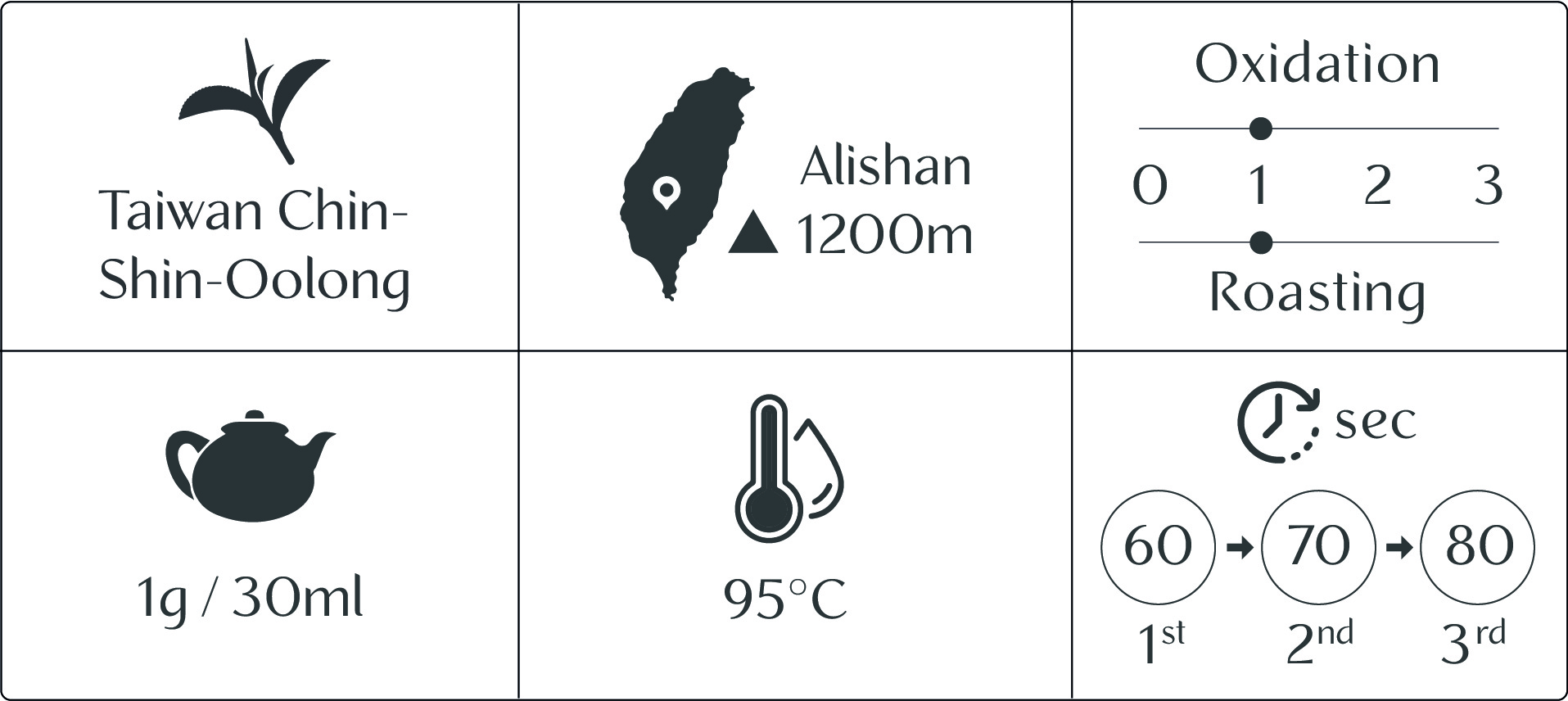
6.1 €
Not available for purchase!
When describing teas, we often use the words ’special’ and ’rare’, but these attributes are particularly valid to our Dayuling Oolong tea. The plantations are the highest in the world, with an altitude of around 2500 meters. The temperature differences between days and nights in the DayuLing Mountains are extremely large. Autumn and winter temperatures are often below zero, the annual average is around 20 degrees though. The soil is rich in organic matters and due to the cold climate, the growth of the plants is slow, the tea leaves are delicate and soft. These unique and high-quality geographical conditions make the tea surpassingly sweet and fragrant. It may sound as a bit of an exaggeration, but Dayuling is in fact one of the rarest teas, with only extremely limited availability: this is why we really appreciate our tea master, Mr. Chang’s generous contribution to our selection of teas.
The leaf base of Dayuling is thick and the leaves’ edges are serrated. Tea plucking is by hand and the lightly oxidized leaves are carefully hand-rolled into small, green-yellow coloured balls.
The tea soup is greenish, clear and very rich in pectin, that results in a full-bodied brew. The appearance of the tea soup is pure and elegant, with a strong floral aroma. Its density is like smelling perfume essence, your nose fills up quickly with the aroma of lily and a special alpine scent. Its tasting notes are very soft and the tea soup leaves a sweet honey flavour on the palate; the sweetish aftertaste lasts for long minutes after consumption.
The leaf base of Dayuling is thick and the leaves’ edges are serrated. Tea plucking is by hand and the lightly oxidized leaves are carefully hand-rolled into small, green-yellow coloured balls.
The tea soup is greenish, clear and very rich in pectin, that results in a full-bodied brew. The appearance of the tea soup is pure and elegant, with a strong floral aroma. Its density is like smelling perfume essence, your nose fills up quickly with the aroma of lily and a special alpine scent. Its tasting notes are very soft and the tea soup leaves a sweet honey flavour on the palate; the sweetish aftertaste lasts for long minutes after consumption.
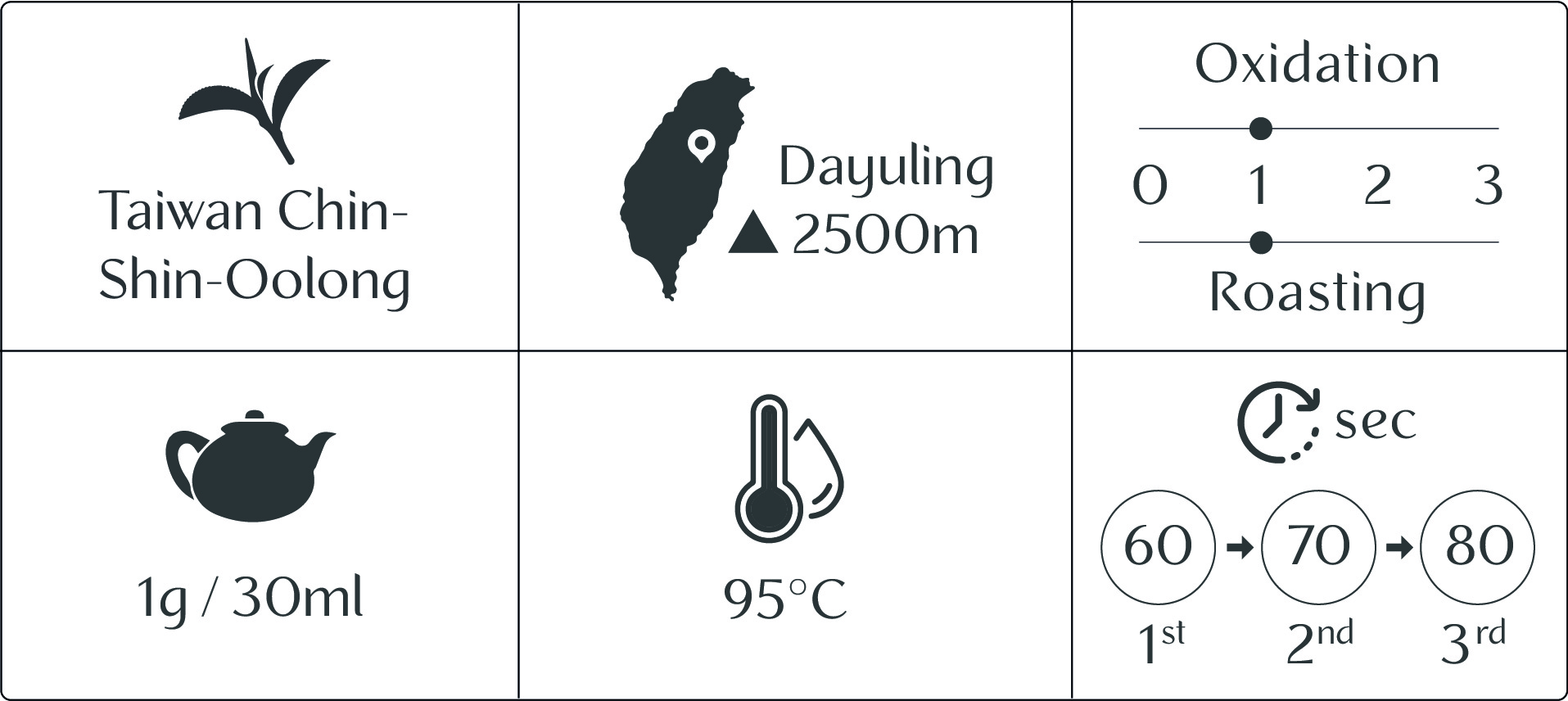
10.2 €
Fu Shou Shan Mountain is the second highest peak of Taiwan’s Lishan mountain range. Tea plantations are surrounded by clouds and mist all year round, growing in the primeval forest, where the climate and water quality is exceptional. Huge differences between day and night temperatures make the plants develop hardy and strong. The soil is fertile, slightly acidic and is free from pollutions. It contains natural nutrients and trace elements, that helps tea leaves become soft and fragrant without being bitter.
Fushoushan Oolong tea is grown at an altitude of 2500 meters, where the cool, constantly moist conditions and the short, but strong sun exposure in the mornings create a uniquely intense flavor, which this varieatal is famous for. Also, it is one of the most regarded teas both in Taiwan and overseas, being the most highly-prized tea specialty of Taiwan at the same time.
The colour of the thick tea leaves is emerald green, fresh and they are hand-rolled into small balls.
The tea soup is clear, with golden-greenish colour and it comes with a unique feature: the more times Fushoushan Oolong is brewed, the purer and stronger the taste evolves, so it makes this tea highly enjoyable all day long. It has a buttery mouthfeel, complemented with the main notes of pear, but if the brewing time is longer its taste becomes more fruity and tropical. The aftertaste is very rich, sweet and persistent.
Fushoushan Oolong tea is grown at an altitude of 2500 meters, where the cool, constantly moist conditions and the short, but strong sun exposure in the mornings create a uniquely intense flavor, which this varieatal is famous for. Also, it is one of the most regarded teas both in Taiwan and overseas, being the most highly-prized tea specialty of Taiwan at the same time.
The colour of the thick tea leaves is emerald green, fresh and they are hand-rolled into small balls.
The tea soup is clear, with golden-greenish colour and it comes with a unique feature: the more times Fushoushan Oolong is brewed, the purer and stronger the taste evolves, so it makes this tea highly enjoyable all day long. It has a buttery mouthfeel, complemented with the main notes of pear, but if the brewing time is longer its taste becomes more fruity and tropical. The aftertaste is very rich, sweet and persistent.
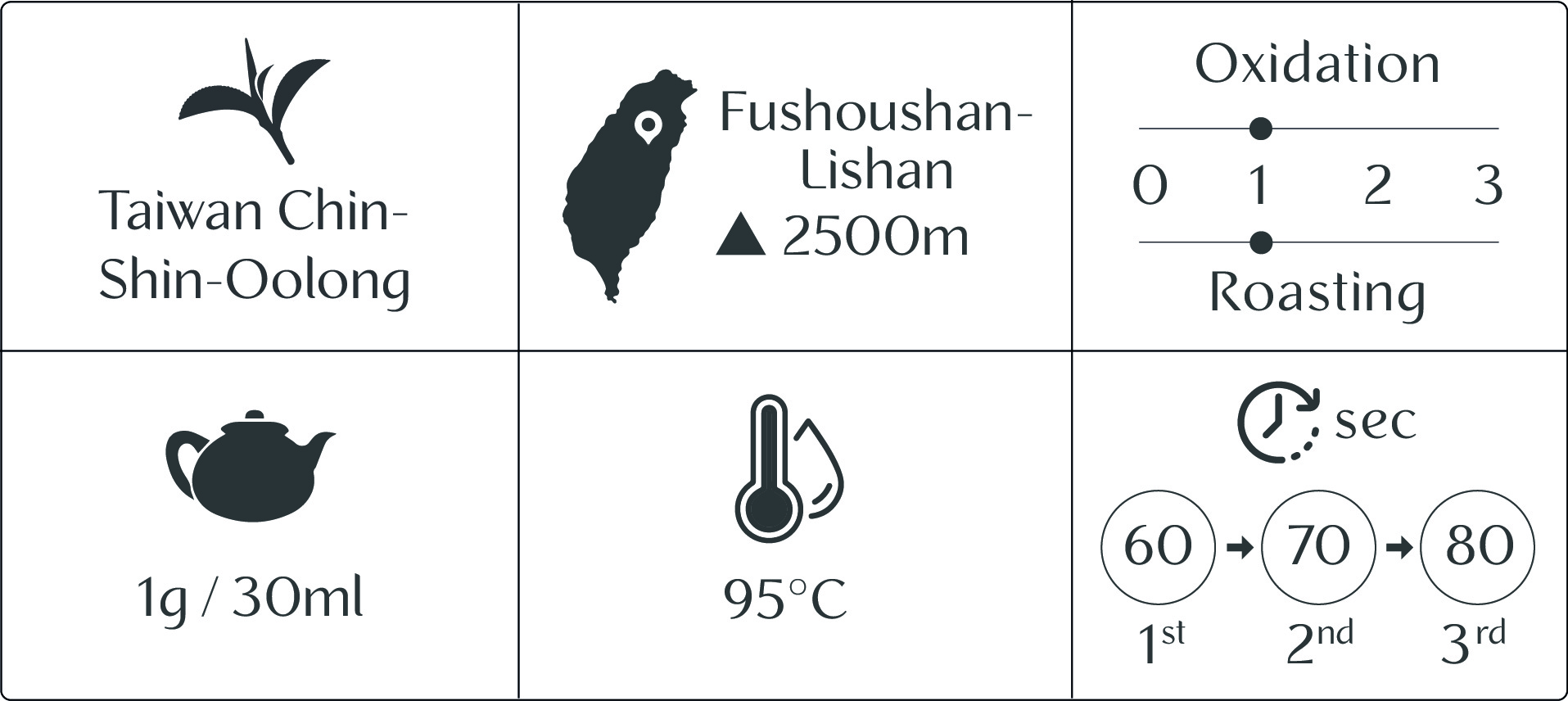
10.2 €
A fragrant high-mountain oolong with golden yellow tea infusion, sweet-honey and floral notes, thanks to Mr Ou's special roasting technique. It turns out that this unique honey aroma is not only the magical power of nature, but also the respect of the mountains and forests by farmers. The beautiful giving back of the land.
The bud and leaves of oolong tea from Mr Ou's farm are bitten by "little green leafhoppers". The tea maker uses traditional tea making methods, after fermentation and light roasting, while retaining the floral aroma of oolong tea and the natural honey aroma produced by the bites of little green leafhoppers .Due to their small size, the little green leafhoppers are extremely sensitive to pesticides hence the tea farmers take special care of as limited usage of the pesticides as much as possible.
The bud and leaves of oolong tea from Mr Ou's farm are bitten by "little green leafhoppers". The tea maker uses traditional tea making methods, after fermentation and light roasting, while retaining the floral aroma of oolong tea and the natural honey aroma produced by the bites of little green leafhoppers .Due to their small size, the little green leafhoppers are extremely sensitive to pesticides hence the tea farmers take special care of as limited usage of the pesticides as much as possible.
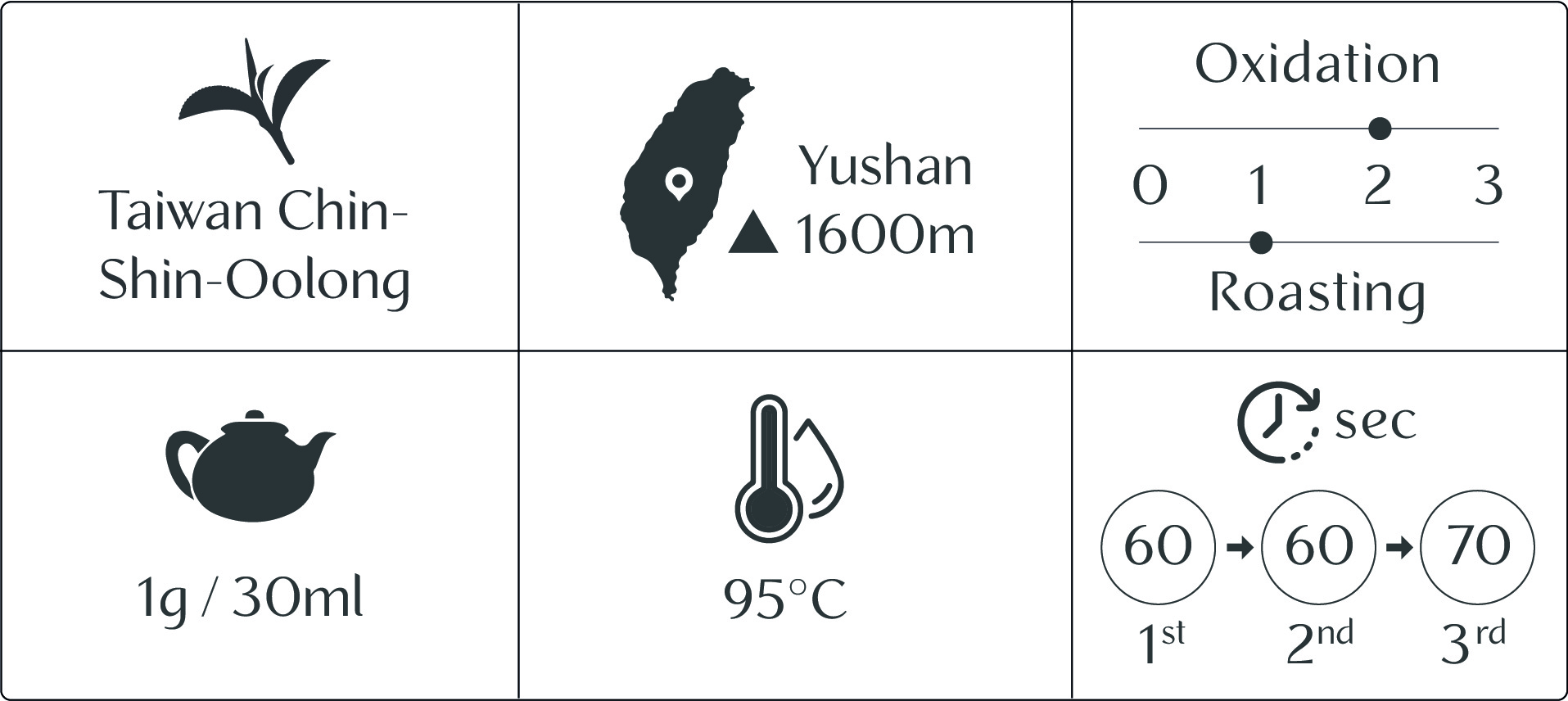
7.2 €
Not available for purchase!
We are thrilled to introduce a new addition to our tea selection, discovered during our recent journey to Taiwan with Mr. Wester, affectionately known as the Prince of Tea by local enthusiasts. Originating from Taiwan's Qi Lai Mountain, this distinctive oolong boasts a wonderful aroma and creamy texture attributed to its high-altitude cultivation. Despite its relative obscurity, it shines for its outstanding qualities. Cultivated at 1900m, it caters to those desiring a vibrant, buttery flavor reminiscent of melon and cashew nuts, evoking the essence of spring. With a medium body and harmonious balance, it promises a delightful experience free from any bitterness. For aficionados seeking something truly remarkable, Qilai Shan oolong is an essential indulgence that promises to captivate your senses.
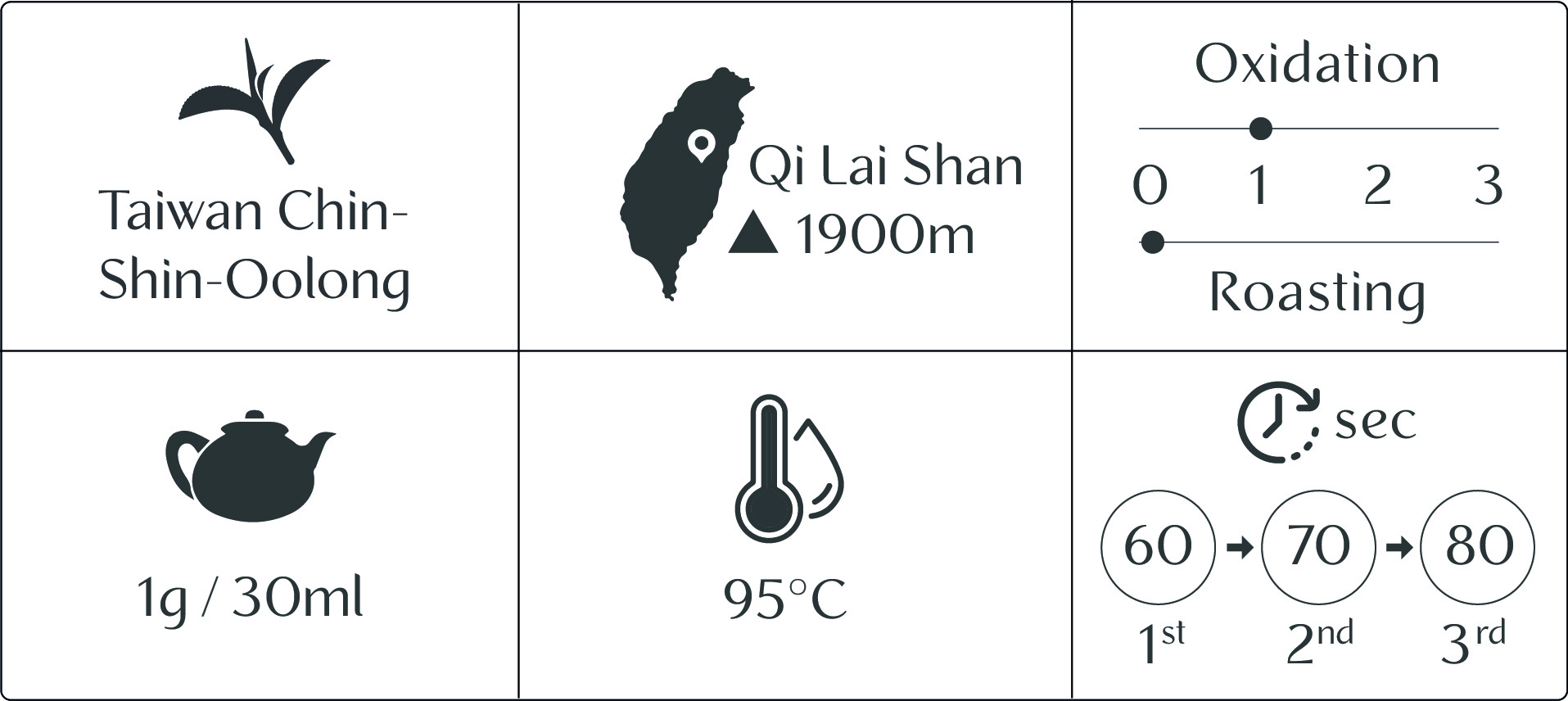
8.2 €
We have already mentioned the special climatic conditions of Shan Lin Xi Mountain in a few words. The wet and cool climate, regardless of the season, and the significant temperature differences between dawn and dusk, all contribute to the unique flavour of the teas grown in the area. Our roasted Shan Lin Xi tea is planted at an altitude of 1,500 metres above sea level, making it one of our high mountain oolong teas. Like our lightly fermented Shan Lin Xi, the roasted version comes from Mr. Lin's farm in Zhushan. The small family owned farm has a strict policy of cultivating the soil free of herbicides and fertilizers, and hand-picking of the leaves which means they follow a completely organic approach. The teas that come out of the farm are typically very lightly roasted, but Mr. Lin, breaking with this tradition, has created this speciality. The tea leaves are subjected to a roasting process using longan tree charcoal, which results in a more robust roast. The brew has a balanced, sweet taste with nutty overtones, with a clean finish that can linger for hours, enhancing the unique taste experience of this edition.
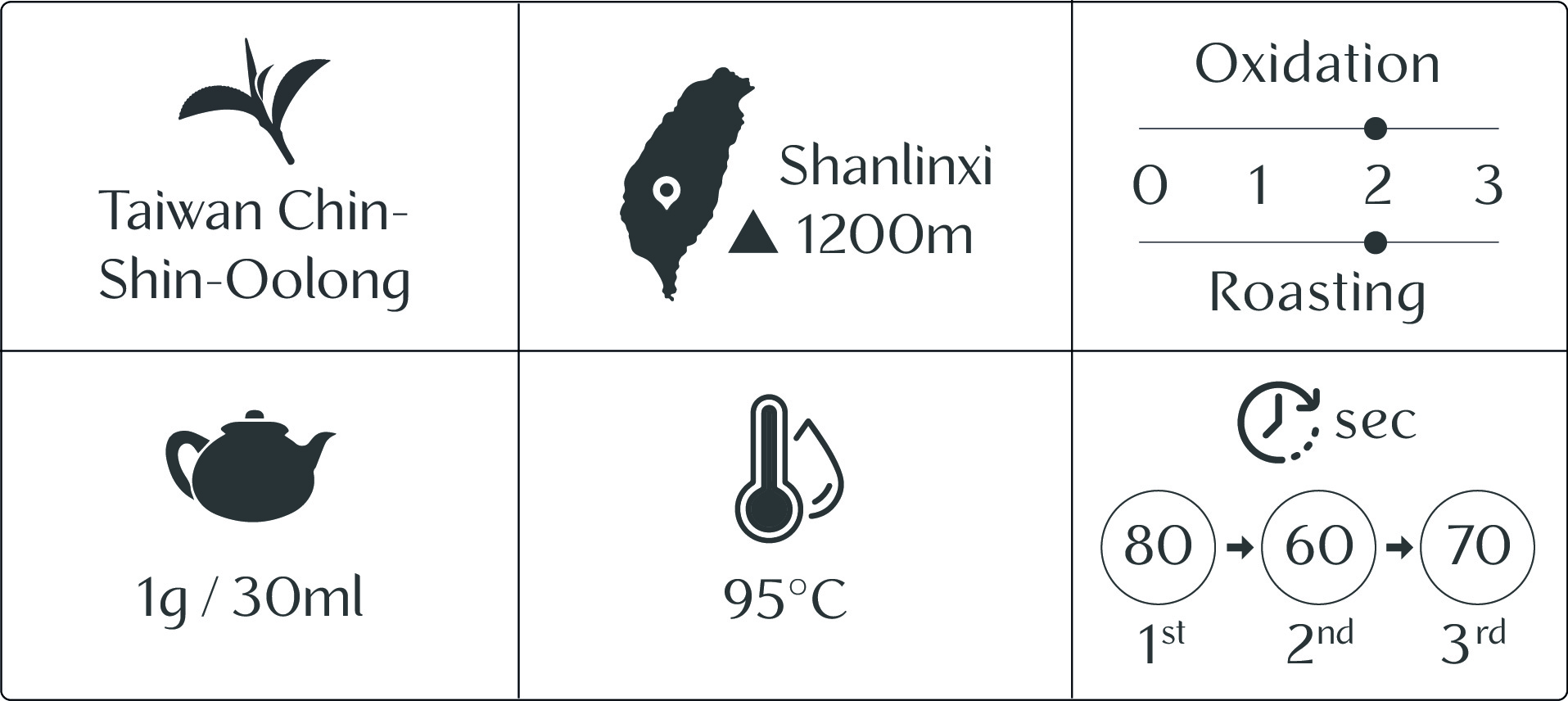
6.8 €
Nowadays, the most famous high-mountain growing regions in Taiwan are Yu Shan (1400 m), Ali Shan (1600 m), Shan Lin Xi (1700m) and Li Shan (2500 m). Higher elevation usually lead to higher quality of tea and it also comes hand-in-hand with organic cultivation and processing methods.
Shan Lin Xi Mountain is surrounded by misty clouds all year round, with cool and wet climate, regardless of the actual season. Huge temperature differences between mornings and evenings are typical in this part of Nantou County. What makes Shanlinxi tea special is the presence of fir tree and bamboo forests growing close to the plantations; many say it has a lot to do with the tea soup’s natural fir fragrance. In addition, because the tea farms are located at different altitudes (the elevation ranges from 1000 meters to 1700 meters), the taste of the brews also noticeably follow this difference.
The flesh of the tea leaves is thick, soft and they are hand-picked for processing. The lightly fermented leaves are then rolled into plump ball-shapes.
The main features of Shanlinxi tea are low bitterness and mellow sweetness. The tea soup is clear, golden yellow and slightly green, with the unmistakeable aroma of the before mentioned fir trees, complemented by the scent of agarwood.
Its tasting notes are smooth, but also very complex and astringent at the same time, that makes it feel marvellously refreshing. Shanlinxi is mildly spicy with vegetal overtones, the notes of green bean and a lingering aftertaste.
Shan Lin Xi Mountain is surrounded by misty clouds all year round, with cool and wet climate, regardless of the actual season. Huge temperature differences between mornings and evenings are typical in this part of Nantou County. What makes Shanlinxi tea special is the presence of fir tree and bamboo forests growing close to the plantations; many say it has a lot to do with the tea soup’s natural fir fragrance. In addition, because the tea farms are located at different altitudes (the elevation ranges from 1000 meters to 1700 meters), the taste of the brews also noticeably follow this difference.
The flesh of the tea leaves is thick, soft and they are hand-picked for processing. The lightly fermented leaves are then rolled into plump ball-shapes.
The main features of Shanlinxi tea are low bitterness and mellow sweetness. The tea soup is clear, golden yellow and slightly green, with the unmistakeable aroma of the before mentioned fir trees, complemented by the scent of agarwood.
Its tasting notes are smooth, but also very complex and astringent at the same time, that makes it feel marvellously refreshing. Shanlinxi is mildly spicy with vegetal overtones, the notes of green bean and a lingering aftertaste.
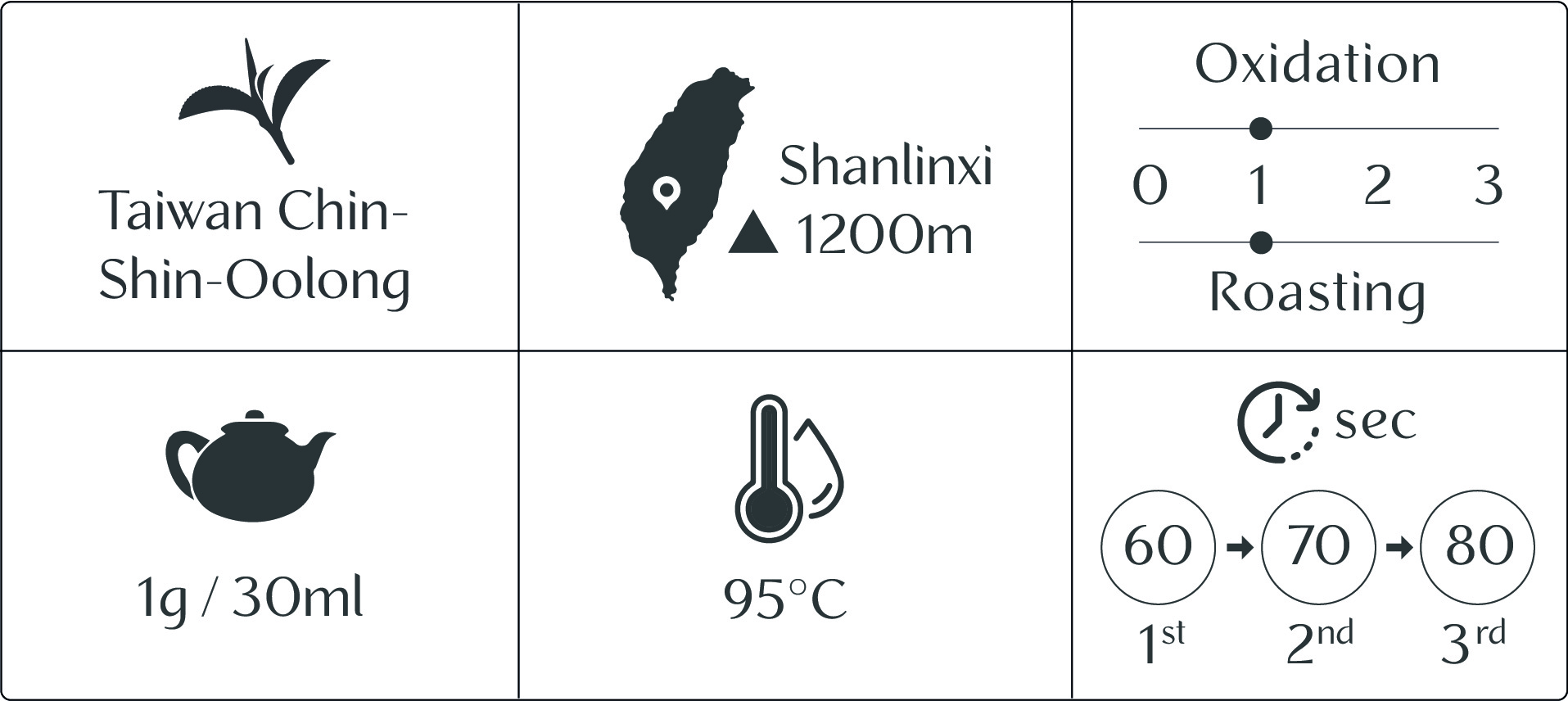
8.2 €
Charcoal Roasted Oolong Tea is a particular type of tea roasted by heat from charcoal. Mr. Ou’s method in the process of making high mountain tea uses charcoal as a heat source, while a short period of high temperature generates the tea saccharification reaction. Because of the penetration of far-infrared rays, the fragrance of alpine tea is greatly preserved, and the tea soup contains a thick and mellow flavor after roasting. The shape of the tea leaves is tight, the color of the tea soup is honey-green, the aroma is fresh, floral elegant and roasted smell, with unique caramel taste.
Located in Xinyi Township, Nantou County, at the foot of Yushan Mountain at an altitude of 1,600 meters, the Yushan tea has a unique fragrance and sweetness. The period from 1986 to 1996 was the golden decade of the Yushan tea area. However, with the popularity of high mountain tea from bigger tea areas, Yushan tea has gradually been forgotten, and Mr. Ou’s family is one of the few tea farmers who still stay in Yushan. Shuili Yushan Tea Farm has a history of 37 years. Mr. Ou, from the second generation of the family, returned to his hometown 10 years ago to take over his father’s tea farm and work together with his younger brother. He is still studying and developing tea-making technology, while his younger brother manages the tea farm full-time. All the tea coming from this farm are eco-friendly as per the processing and cultivation too.
Located in Xinyi Township, Nantou County, at the foot of Yushan Mountain at an altitude of 1,600 meters, the Yushan tea has a unique fragrance and sweetness. The period from 1986 to 1996 was the golden decade of the Yushan tea area. However, with the popularity of high mountain tea from bigger tea areas, Yushan tea has gradually been forgotten, and Mr. Ou’s family is one of the few tea farmers who still stay in Yushan. Shuili Yushan Tea Farm has a history of 37 years. Mr. Ou, from the second generation of the family, returned to his hometown 10 years ago to take over his father’s tea farm and work together with his younger brother. He is still studying and developing tea-making technology, while his younger brother manages the tea farm full-time. All the tea coming from this farm are eco-friendly as per the processing and cultivation too.
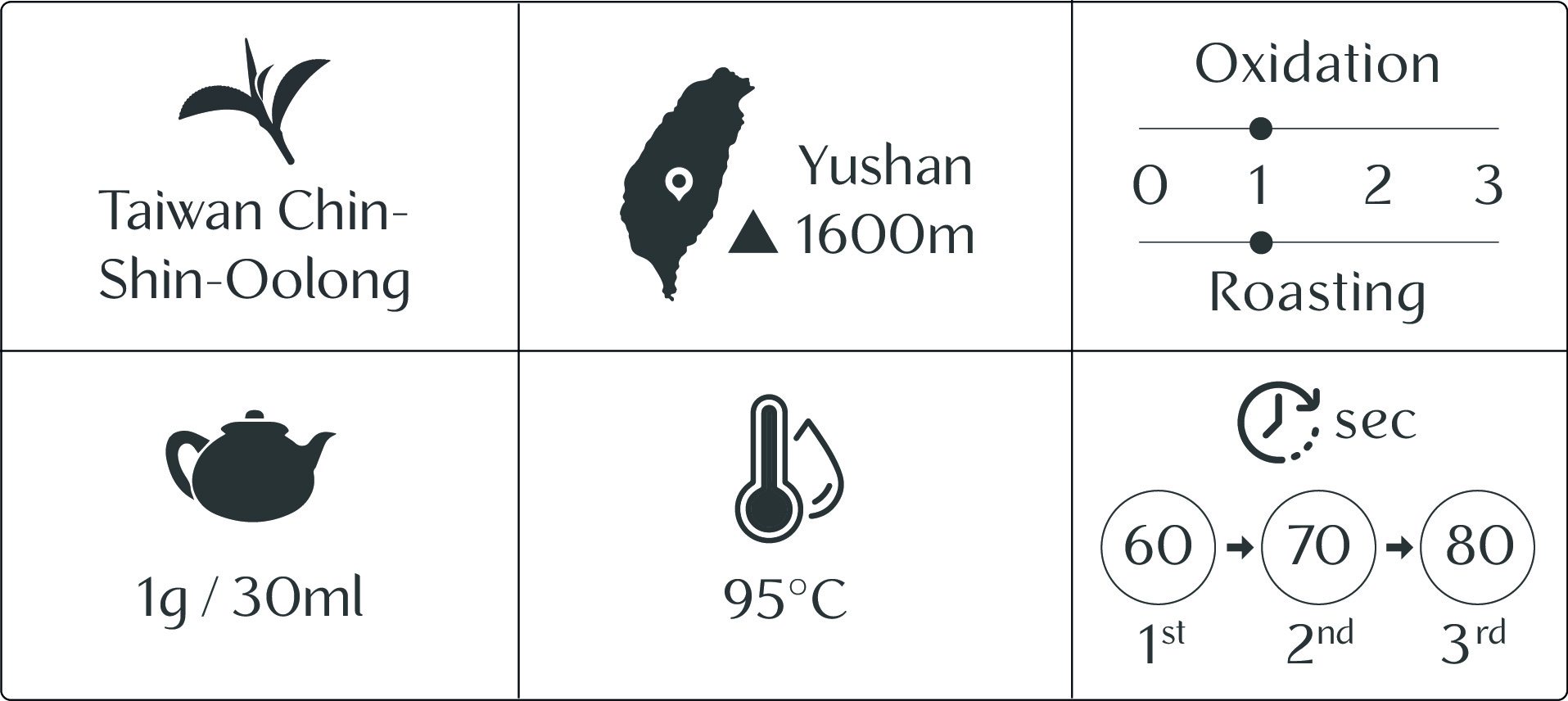
12.3 €













